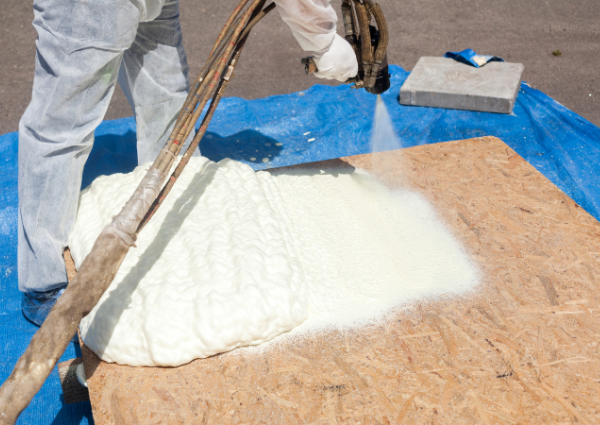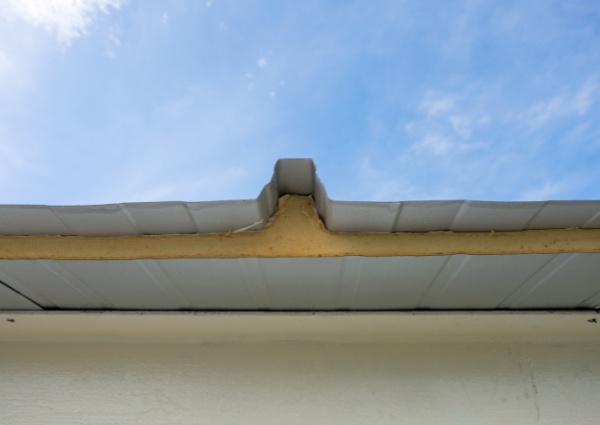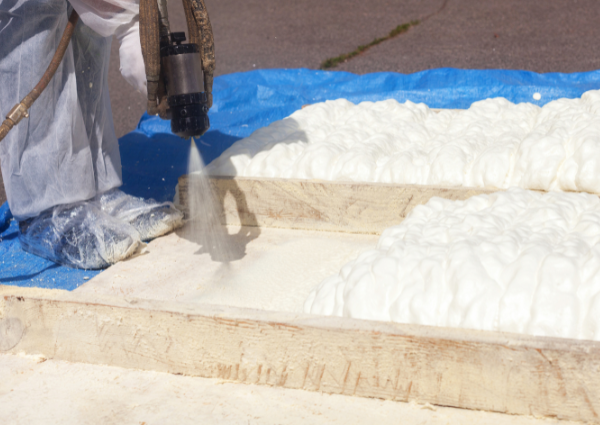In today’s world, we all want to get the most “bang for our buck.” What makes your commercial roofing system any different?
Although the final decision rests with the building owner, we want to highlight certain benefits and drawbacks of spray polyurethane foam roofing systems, also known as SPF roofing.
So, what is SPF Roofing?
Ken Byler, the owner of Easy Roof Solutions with over 35 years of experience in the professional roofing industry in Arizona, explains everything you need to know when deciding whether an SPF roof is the right choice for you.
What Is SPF Roofing?
When isocyanate (A) and polyol (B) are combined under heat and pressure, SPF, a plural-component material, is produced. A lightweight, solid, and completely adherent roofing membrane is created when chemicals A and B are sprayed together in liquid form.
“Although spray foam has been around for years, many property owners and facility managers are still not very familiar with it,” says Byler. He then explained how SPF became a staple roofing solution offered by many roofing contractors today.
Spray Polyurethane Foam (SPF) has been utilized since the 1940s in many other fields and applications; however, it wasn’t until the late 1970s that it began to be applied to flat roofs because of its exceptional insulation properties and UV protection.
“Both open-cell and closed-cell spray foam roofing products are available today. Open-cell foam is typically used for soundproofing and internal insulation, while closed-cell foam is mostly used in commercial SPF roofing systems,” Byler explained.

The Basics of Spray Polyurethane Foam (SPF) Roofing Systems
SPF components are combined and applied on-site using a specialized spray foam apparatus in spray foam roofing. The two liquid components are kept in separate containers and are pumped through high-pressure hoses.
Ken Byler emphasized that the correct quantity of pressure and heat must be used during the installation procedure. The reason?
“To guarantee a successful application,” says Byler. “As the foam dries, it hardens to create a smooth, strong, lightweight barrier that is waterproof. SPF is suited for use in almost all climates and offers the highest R-value (thermal resistance measure) of any roofing material,” he added.

The Average Cost of SPF Roofing Systems
The price of a spray foam roof ranges from $5 to $8 per square foot. These statistics primarily depend on the complexity and size of the roof structure as well as the thickness of the foam.
There are more aspects to take into account, including location, the roof substrate’s condition, the top coating material, warranty, etc.
It’s important to note that SPF systems have been shown to drastically lower a building’s energy costs, resulting in a significantly quicker return on investment.
Pros of SPF Roofing Systems
Energy Efficient
SPF roofing provides the best insulation for buildings. The polyurethane foam lowers energy costs by keeping heat inside during the winter and outside during the summer.
“This foam layer is shielded from UV rays by the silicone coating, which also lessens heat absorption,” Ken Byler explains.
Additionally, SPF roofing systems offer the highest R-value per inch, which translates to a higher insulation value for the building.
It also provides air, thermal, and moisture barriers, which promote energy efficiency.
Easy Installation
With your new SPF roof, the ease of installation helps save you time and money.
SPF roofs are installed by spraying the liquid and allowing it to expand into foam. Hence, the foam can adapt to any roof type, even irregularly-shaped roofs.
The SPF roof can be installed immediately over concrete, asphalt, metal, shingles, and wood.
[Read: 8 Types of Commercial Roofing: Everything You Need to Know]
Renewable and Sustainable
During its lifetime, SPF roofs produce minimal to no waste. The SPF roof is typically put on top of the original roof with little to no stripping of the previous roof, avoiding the need for costly roof tear-offs.
An SPF system also adds a protective coating to your entire roof.
According to Ken Byler, spray foam roofs also make use of environmentally friendly materials:
- Low in the Emission of Volatile Organic Compounds
- Zero Ozone Depleting Potential
- Ultra-low Global Warming Potential
- Free from Chlorofluorocarbons
Waterproof and Seamless
In conventional roofing systems, penetrations and seams are the main places where leaks occur; spray foam reduces this vulnerability.
Spray foam fills seams, gaps, and cracks in the roof because it is applied as a liquid.
The contractor can level out the roof and lessen the possibility of ponding water by applying polyurethane foam.
Cons of a Foam Roof

Limited Application Window
SPF can only be applied to the roof surface during certain temperatures. You can’t install an SPF roof when there is frost, ice, visible dampness, or surface moisture on the existing roof.
Overspray Potential
The potential of overspray onto nearby cars and other surfaces exists since the SPF roof system is installed by a spray application.
Even though there is no health risk from this, the surrounding property is at risk.
Contractor Experience
“Not every SPF contractor is the same,” Byler wants to remind readers.
“Working with SPF calls for extensive product knowledge and the usage of high-end application tools and methods. Those who are thinking about installing a spray foam system should do their research to select a qualified SPF roofing contractor,” he added.
Ken Byler also states that the Spray Polyurethane Foam Alliance (SPFA) has a certification program with multiple levels that contractors need to pass.

Is an SPF Roof Worth it?
Unquestionably, SPF is one of the most stunning roofing materials on the market for commercial buildings. Other conventional roofing materials can’t match the many advantages that SPF roof systems provide.
Our aim at Easy Roof Solutions, is to provide you with a strong, long-lasting roof that will safeguard your commercial building.
That entails selecting the ideal roofing systems for your needs while collaborating with our award-winning staff.
Reach out to our team today for a consultation or a free quote!
Ken Byler
Founder of Easy Roof Solutions, LLC. He started in the construction industry at the age of 14 and has been involved in it for over 25 years. His wide experience in commercial roofing speaks for itself.
Outside his roofing work, Ken enjoys being in the great outdoors, traveling to new places, and bonding with his wife and children.


